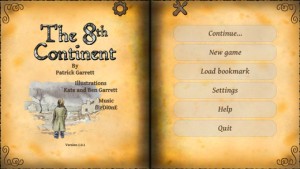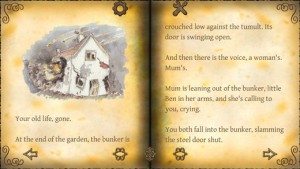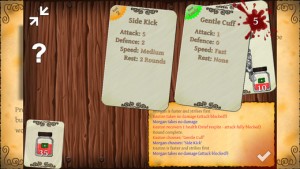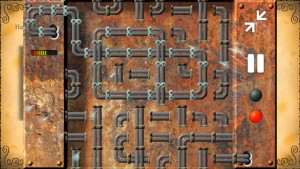 The 8th Continent, a gamebook app programmed by Ben Garrett, written by Patrick Garret and illustrated by Kate and Ben Garrett (this is one creative family!) tells the story of Morgan, a teenager who has to survive and find his family after a super-eruption destroyed the world as we know it. A post-apocalyptic adventure gamebook, that tries to make some interesting innovations in the media.
The 8th Continent, a gamebook app programmed by Ben Garrett, written by Patrick Garret and illustrated by Kate and Ben Garrett (this is one creative family!) tells the story of Morgan, a teenager who has to survive and find his family after a super-eruption destroyed the world as we know it. A post-apocalyptic adventure gamebook, that tries to make some interesting innovations in the media.
The post-apocalyptic fiction is a subgenre of science fiction with a long history. The subgenre became popular in the eighties, with the nuclear fear of the Cold War, but we can find it as early as Mary Shelley‘s “The Last Man” in 1826. And even earlier, if we consider the Book of Revelation, or the story of the great flood and Noah’s ark in the Bible.
 These stories, which usually narrate the destruction and rebirth of our world, become more popular in times of great social and political crisis. “The Last Man“, by Mary Shelley, talked about the failure of romantic political ideas. During the Great Depression in the 30s, novels like Stephen Vincent Benét‘s “By the waters of Babylon” described the ruins of the United States after a “great burning”. The Cold War brought, of course, hundreds of examples, born with the fear of global annihilation by nuclear weapons. And, after the fall of Lehman Brothers and the beginning of our current global systemic crisis, it’s no wonder that post-apocalypse becomes popular again. Usually in the form of the “zombie-apocalypse”, but also in more creative ways, like the “super-eruption” described in this story.
These stories, which usually narrate the destruction and rebirth of our world, become more popular in times of great social and political crisis. “The Last Man“, by Mary Shelley, talked about the failure of romantic political ideas. During the Great Depression in the 30s, novels like Stephen Vincent Benét‘s “By the waters of Babylon” described the ruins of the United States after a “great burning”. The Cold War brought, of course, hundreds of examples, born with the fear of global annihilation by nuclear weapons. And, after the fall of Lehman Brothers and the beginning of our current global systemic crisis, it’s no wonder that post-apocalypse becomes popular again. Usually in the form of the “zombie-apocalypse”, but also in more creative ways, like the “super-eruption” described in this story.
As we mentioned before, in this story we take the role of a teenager called Morgan, a guy who witnesses the destruction of his city one morning, and is forced to hide with his family inside a bunker. After this is narrated in the first chapter, we are told how Morgan’s family is taken away by a group of mysterious kidnappers. And, as it is mandatory in any adventure story, he decides to go looking for the kidnappers and save his family from them.
 “8th Continent” tries to do some very interesting things with the gamebook media on mobile phones, by giving it more of a “game-y” feel. Placed among the narrative, there are three kinds of games, that appear whenever a specific situation arises. Whenever our character wants to search for objects, we arrive to a “Scavenging” game, basically a “match-three puzzle” kind of game. Whenever we have to force an electronic lock, it’s time for a “Hacking” game (a puzzle game similar to the old “Pipe Mania“). And even when we have to fight an adversary, we are taken to a “Fighting” game.
“8th Continent” tries to do some very interesting things with the gamebook media on mobile phones, by giving it more of a “game-y” feel. Placed among the narrative, there are three kinds of games, that appear whenever a specific situation arises. Whenever our character wants to search for objects, we arrive to a “Scavenging” game, basically a “match-three puzzle” kind of game. Whenever we have to force an electronic lock, it’s time for a “Hacking” game (a puzzle game similar to the old “Pipe Mania“). And even when we have to fight an adversary, we are taken to a “Fighting” game.
The result of these experiments is mixed. I think it’s interesting to try new ways to add interactivity to gamebook apps, and even to mix computer game mechanics with narrative. Still, the “scavenging” and “hacking” games, even if they are fun to play, don’t feel part of the overall story. When we are searching for medicines inside the ruins of a house, and suddenly we have to play a “candy crush” clone… well, it feels as if we were playing a different game altogether.
The “fighting” game, though, is a fantastic idea, very well executed. Instead of the random dice rolls we usually find in these kind of stories, here there is some strategy to the confrontations, in the form of a card game, where we exchange attacks and defences with our enemies, trying to eliminate them while minimising the damage we receive. Those “combat cards” are also much better interlaced with the narrative, as we obtain them when we discover weaknesses in some of our enemies, or when we use the environment to our benefit.
 There is a fourth kind of game, a completely optional “decoding” game where we decrypt the entries of our father’s journal. This won’t give us any benefit in the story, but will add some interesting additional background information.
There is a fourth kind of game, a completely optional “decoding” game where we decrypt the entries of our father’s journal. This won’t give us any benefit in the story, but will add some interesting additional background information.
I am leaving the best part for the end. The writing of this gamebook is fantastic. It really manages to make us feel that the world being described in the story is real, the world is alive, and even the characters are believable. Here we won’t find “good” or “bad” characters, just people struggling to stay alive. Also, some of the descriptions in “8th Continent” are the most beautiful that I’ve read in any gamebook. Patrick Garrett is a very talented new writer, and I can only encourage him to keep writing. As a gamebook, it tends to be a bit more linear than many (as one of the archievements, “Completionist”, says, it is possible to read the vast majority of pages in a single playthrough), but I am sure issues like these will be fixed in future entries of this series.
I’ve liked “8th Continent” a lot. A good gamebook, not without problems, but excellently written, and a story that I will love to see continued.

I’ve played the game and I agree with you completely. The two puzzles you have talked about can become a bit annoying at times, but it’s a good app overall.